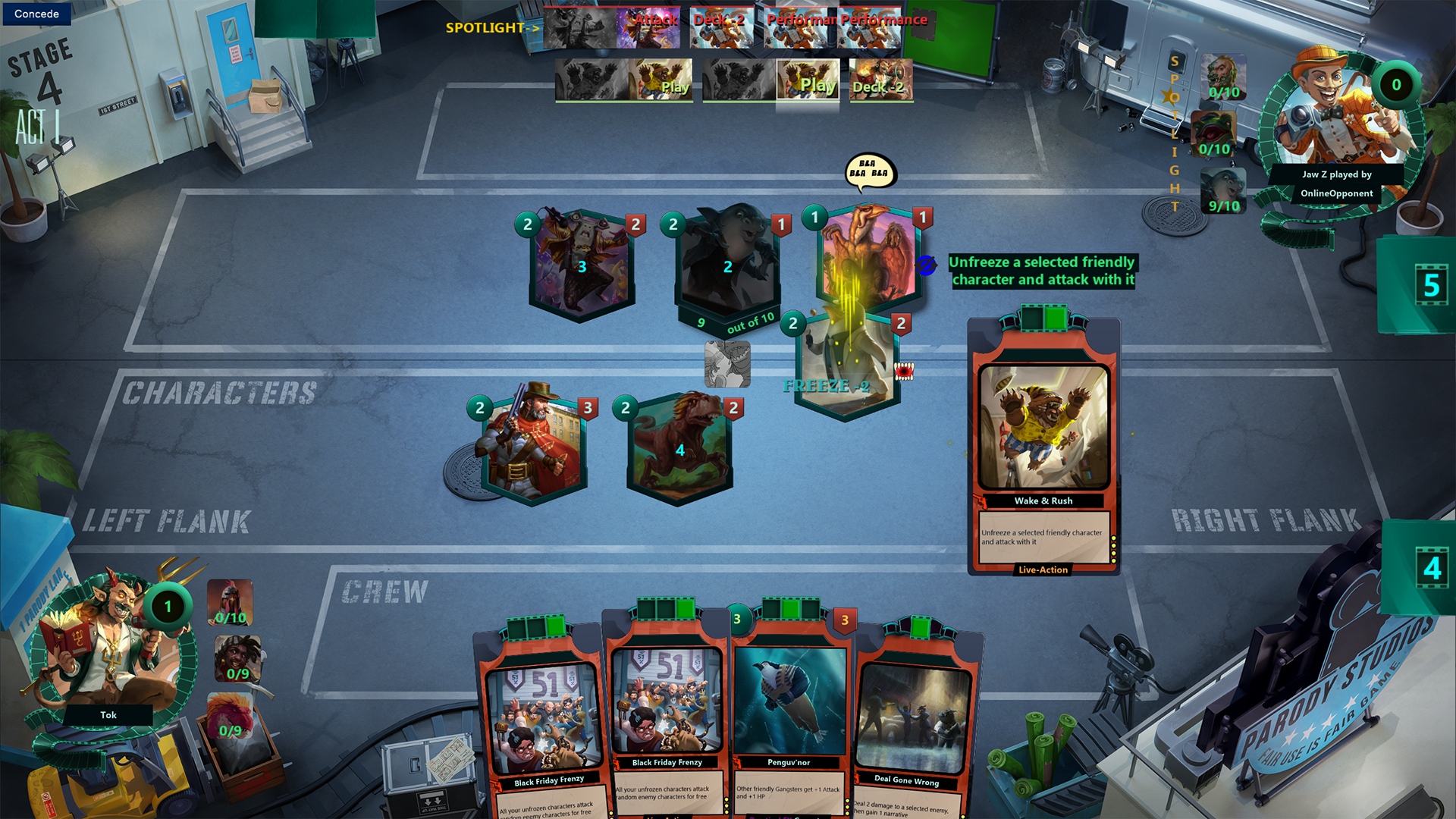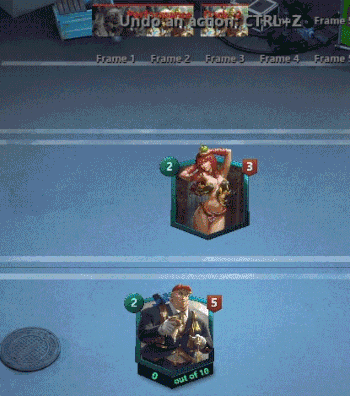
The gameplay of ScreenPlay lets you focus on shooting your own masterpiece and developing your own victory conditions, cracking skulls with Rex Supreme or hanging back and shooting off tropes with Richard Spade. However, putting these lead characters on the board itself places a lot of emphasis on how these pieces interact. Your characters have plenty to do on the board, building your victory conditions, disrupting opposing performances, and even more critically, cutting off your opponent from their narrative by sending leads backstage.
Rather than moving these pieces around a gameboard like Chess or Diplomacy, your characters in ScreenPlay have three basic actions Perform, Attack, and Dodge. This set of options—generate Narrative, target an enemy character, defend against enemy targeting—offer a classic Rock, Paper, Scissors: perform beats dodge, dodge beats attack, and attack beats perform. In Chess, your opponent knows what you can do with your move, but in Poker or Rock, Paper, Scissor, they don’t know what you will do until it’s too late for them to react, so you can bluff or deceive. This deceptively simple set of actions presents a recipe for dynamic gameplay that is tantalizingly easy to pick up, but only gets more interesting as you play the game more.
The gameplay itself is inspired by certain fighting games, in which rather than relying complex button inputs, the gameplay was similarly oriented toward a streamlined Rock, Paper, Scissors, where strikes beat throws, throws beat blocks, and blocks beat strikes. The inputs are accessible to users, leading to a smooth experience for users, using robust, straightforward actions rather than wrestling with a controller. Actions in ScreenPlay are also easy to understand and easily implemented in your own scene and you have the same amount of time as your opponent to piece together the perfect set of frames.
The strategic turn-based gameplay of ScreenPlay gives you time to set up your scene exactly the way you want, to schedule your actions and have them revealed at the same time as your opponents as you both watch the action unfold. The actions themselves are elegantly balanced. Perform allows you to advance closer to winning, but leaves your characters and narrative vulnerable to attacks, and unlike dodging, your characters all perform at once, so an attack on any of them will interrupt the performance. You might expect to perform when your opponent does have obvious ways to punish like attacking or when you want to start racing toward your victory. Attacks can generate tempo and value, potentially stealing narrative as well as disrupting your opponent’s board, but unlike the other actions, it has the cost of freezing your character. Attacks provide durable ways to control your opponent’s side of the board but also require you to commit both your frames and the three scenes that your attacker will be frozen. Your dodge will always beat your opponent’s attack if you set it at the right time, but this defensive action doesn’t generate narrative by itself. Dodging, then, gives you a way to react to an opponent committing to the attack and using their aggressive actions against them, freezing their character as you prepare your response. These actions are carefully balanced to present equitable choices, so that rather than wrestling with the mechanics of the game itself, a game of ScreenPlay can more closely resemble Poker, where you spend the game playing your opponent.
The A > B > C > A pattern gives a clear sense of what outcomes you can expect when your actions collide with your opponent’s actions, you still have to know where that action will come from or where it will land. You can dodge an attack or trope with a single action, but if your opponent figures out what character you’re protecting, they can just attack someone else letting your dodge whiff, squandering your precious frames. If you have spotlight and are positive you know where an attack is coming from, even if you don’t know where it is going, you can try to cut it off with a counterattack. And this is all just the three basic actions of the game; as you start layering effects from tropes, crew, and character abilities, you can see even more complex gameplay that emerges from this set of basic interactions. If your opponent tries to pounce by attacking your frozen character, you could have a trope of your own to freeze their character and cut off its attack. If your opponent thinks your empty board is a ripe target for some easy narrative by performing, you can surprise them with a damage trope to stop their performance. This robust system is allows you to take seemingly simple basic actions and mix them up into a wide variety of play patterns. Easy to learn, but difficult to master.

If you are one narrative point away from winning, your opponent basically has only two options: finish their storyline immediately or stop you from finishing yours. So it might seem like the most obvious thing for you to do is to dodge with your lead, assuming that your opponent needs to attack it in order to slow down your victory. But if you do that too predictably, then your opponent may know to perform, wasting your dodge and freezing your lead, allowing them to easily knock out your Lead to buy themselves some time. If you are even more clever you might make it all the way back around and go for that attack on your opponent, anticipating their perform, and stealing a narrative for the win! Learning how to the play the game will only be the first step in winning at ScreenPlay as you have to guess and play your way through your opponent.
Your opponent will have to play the same mind games that you do, guessing and gambling on what you are doing too, and which of these simple choices will be the right one at any given moment isn’t a matter of any simple flowchart. The right moves will change dramatically from game to game, opponent to opponent. You can bluff your opponent into playing defensively and punishing with Perform while also building your own Narrative. Or you can take a big swing with a risky attack and hope you’re your gambit sabotages your opponent, stealing some narrative along the way! If you can predict where your opponent will attack you can dodge and waste their actions. If you can successfully outmaneuver your opponent by being unpredictable, you can take advantage of these tactics, and the rewards for being unpredictable means you can always shake up gameplay yourself.



